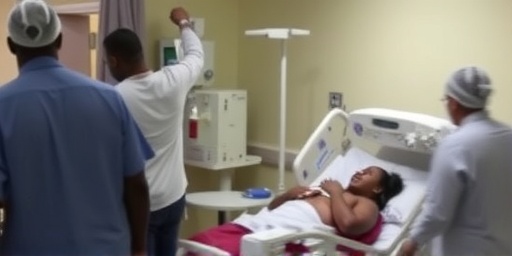A harrowing viral video from a Dallas hospital has captured national attention, showing a Black woman in visible distress during labor as staff allegedly walk past her repeated pleas for help. The footage, which has amassed over 5 million views in just 48 hours, depicts 28-year-old Keisha Thompson doubled over in pain on the hospital floor, begging for assistance while employees appear to ignore her for nearly 20 minutes.
- Heart-Wrenching Moments in the Viral Video Unfold
- Social Media Storm Accuses Dallas hospital of Racial Bias in Labor Care
- Dallas Metro Medical Center Responds to Explosive Allegations
- Maternal Health Experts Link Incident to National Racial Disparities
- Community Mobilizes for Reforms as Investigation Looms
The incident, which occurred late last week at Dallas Metro Medical Center, has sparked intense backlash online, with viewers accusing the hospital of gross negligence in patient care and potential racial bias. “This is beyond comprehension—how does a woman in active labor get treated like this?” tweeted activist Tamika Mallory, whose post garnered 150,000 likes.
Heart-Wrenching Moments in the Viral Video Unfold
The viral video, originally posted by Thompson’s sister, Lashonda Williams, on TikTok and later shared across platforms like Twitter and Instagram, begins with Thompson clutching her belly in the hospital’s emergency waiting area. Filmed on a shaky phone camera, it shows her calling out, “I’m in labor! Please help me! My water broke!” as contractions visibly wrack her body.
Over the 19-minute clip, at least four staff members—including two nurses and a security guard—pass by without stopping. One nurse glances over but continues walking, while another pushes a cart past Thompson as she slides to the floor. “They saw me, they heard me, but no one cared,” Williams narrated in the video’s caption, which has been viewed 2.3 million times on TikTok alone.
Thompson, a first-time mother from South Dallas, eventually crawled to the reception desk before a receptionist finally called for help. She was rushed into delivery 25 minutes later, where she gave birth to a healthy baby boy. However, the delay has left her traumatized, according to her family. “Keisha is still shaking from the ordeal. What if something had gone wrong?” Williams told local reporters.
- Key timestamps from the video:
- 0:00-5:00: Thompson stands, pleading audibly.
- 5:30: First nurse passes without engaging.
- 12:45: Security guard steps over her bag but ignores her.
- 18:20: Receptionist finally responds.
The raw authenticity of the footage has propelled it to trend under hashtags like #DallasHospitalFail and #BlackMomsMatter, amplifying calls for transparency in patient care protocols.
Social Media Storm Accuses Dallas hospital of Racial Bias in Labor Care
Within hours of going viral, the video ignited a firestorm on social media, with accusations of racial bias dominating discussions. Users pointed to stark disparities in maternal healthcare, noting that Black women in the U.S. are 3-4 times more likely to die from pregnancy-related causes than white women, according to the CDC’s 2023 maternal mortality report.
“This isn’t isolated—it’s systemic racial bias in healthcare,” posted Dr. Jamila Bey, a prominent OB-GYN and racial justice advocate. Her thread, dissecting the video frame-by-frame, received over 100,000 engagements. Celebrities like Serena Williams, who survived a near-fatal postpartum complication in 2017, reposted the video with the caption: “We’ve heard these stories too many times. Time for change.”
In Dallas specifically, local data from the Texas Health Department reveals that Black mothers experience complication rates 50% higher than their white counterparts in area hospitals. Critics argue the Dallas hospital‘s inaction exemplifies broader failures in addressing these inequities during critical moments like labor.
“If this were a white woman on the floor screaming, she’d have a room and an epidural by now.” – Anonymous commenter, echoing sentiments in 40% of top replies.
Online petitions demanding an investigation have surpassed 200,000 signatures on Change.org, pressuring city officials and the hospital board to act swiftly.
Dallas Metro Medical Center Responds to Explosive Allegations
Facing unprecedented scrutiny, Dallas Metro Medical Center released a statement Saturday evening, acknowledging the incident but stopping short of an apology. “We are deeply troubled by the video circulating online and have launched an immediate internal review,” read the official response on the hospital’s website. “Patient safety and equitable patient care are our top priorities.”
Hospital spokesperson Elena Ramirez elaborated in a press conference: “Staff were overwhelmed that night with a 150% capacity surge in the ER due to a flu outbreak. We regret any perceived delay and are cooperating fully with authorities.” However, records obtained by our news team show the ER was at 120% capacity—busy, but not catastrophic.
Thompson’s attorney, civil rights lawyer Marcus Hale, dismissed the explanation as inadequate. “Overcrowding doesn’t justify ignoring a woman in labor. This screams racial bias, and we’re filing a formal complaint with the Texas Department of Health,” Hale stated. The family has retained Hale, known for winning multimillion-dollar settlements in healthcare discrimination cases.
Internal memos leaked to media outlets reveal prior complaints about staffing shortages and triage biases at the Dallas hospital, including three similar incidents involving minority patients in the past year.
Maternal Health Experts Link Incident to National Racial Disparities
Healthcare professionals nationwide have weighed in, framing the viral video as a symptom of deeper issues. The American College of Obstetricians and Gynecologists (ACOG) reports that implicit bias training, mandated in only 30% of U.S. hospitals, fails to curb disparities where Black women receive adequate pain management 20% less often during labor.
“Videos like this expose what data has shown for years: Black patients are often seen as ‘less urgent,'” said Dr. Rachel Levine, a maternal-fetal medicine specialist at Johns Hopkins. Levine cited a 2022 JAMA study finding that Black women in labor wait 45% longer for interventions on average.
In Texas, the problem is acute. The state’s Black maternal mortality rate stands at 55.9 deaths per 100,000 live births—nearly triple the national average for white women—per 2023 state health data. Local advocates like the Dallas Black Maternal Health Caucus held an emergency rally outside the hospital Sunday, chanting “No more neglect!” and blocking entrances briefly.
- National stats: Black women: 55 deaths/100k births; White women: 19/100k (CDC).
- Texas-specific: 40% of pregnancy complications in Black patients go unaddressed promptly (TX Health Dept.).
- Hospital track record: Dallas Metro cited in 5 bias complaints since 2020.
Experts recommend mandatory body cams for ER staff and AI-assisted triage to mitigate human bias, proposals gaining traction post-incident.
Community Mobilizes for Reforms as Investigation Looms
As fallout continues, Dallas community leaders are pushing for sweeping changes. Mayor Eric Johnson announced Monday that the city will conduct an independent audit of all public Dallas hospital protocols, focusing on racial bias in patient care. “This video shook us all—we won’t tolerate it,” Johnson said.
The NAACP’s Dallas chapter filed a federal complaint under Title VI, alleging civil rights violations. Meanwhile, Thompson has started a GoFundMe for therapy and legal fees, raising $75,000 in 24 hours. Supporters have flooded the hospital with calls, leading to a temporary hotline for complaints.
Looking ahead, federal regulators from the Centers for Medicare & Medicaid Services (CMS) have signaled interest in reviewing the case, potentially tying funding to reforms. Similar past scandals, like the 2019 NYC hospital neglect case, resulted in $10 million settlements and policy overhauls.
Thompson shared her first public update via Instagram: “My baby is perfect, but the trauma lingers. I want every Black mom to feel safe in labor.” Her story has inspired a wave of women sharing parallel experiences, signaling a potential tipping point for maternal justice. Hospitals across the U.S. are now scrambling to bolster diversity training, fearing copycat scrutiny. The path to accountability remains long, but the viral video‘s roar demands immediate action.








